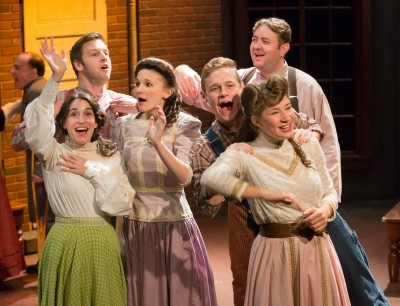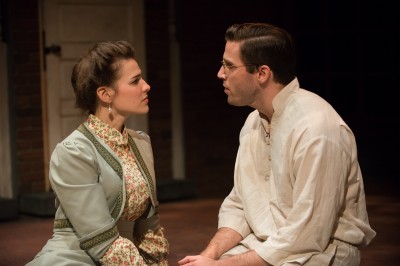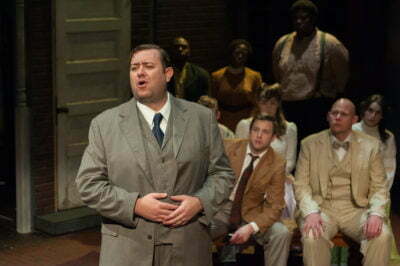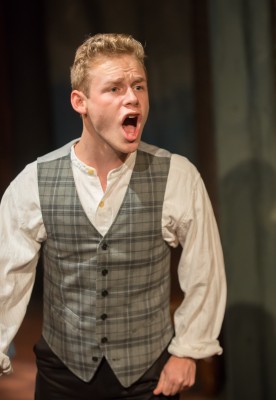Parade
Music and Lyrics by Jason Robert Brown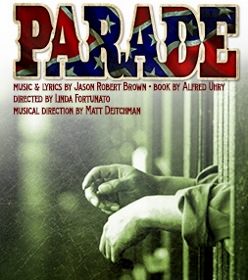
Book by Alfred Uhry
Directed by Linda Fortunato
Music Direction by Matt Deitchman
Produced by BoHo Theatre
Excruciating Story Brought Back to Life
Parade begins with a Confederate soldier singing a propagandistic ode to an earlier, simpler, “purer” time of slavery. The song immediately made me nauseous, and BoHo’s fine retelling of two murders a century ago had me fighting to stop from dry heaving at intermission. In this case, that’s a mark of success.
The story is that of the 1915 lynching of Jewish industrialist Leo Frank (Jim Deselm) in Georgia. Leo is from Brooklyn, came to Georgia to manage a relative’s pencil factory, and can’t stand the South. It doesn’t care for him, either. His wife, Lucille (Sarah Bockel), an Atlanta native, thinks he’s overly hard on a region he doesn’t understand, and often wishes her husband could be more emotionally intimate. On Confederate Memorial Day, one of the girls who works in the factory, thirteen year old Mary Phagan (Peyton Tinder) comes Leo’s office to collect her pay. That night, she is found murdered in the factory basement.
The whole state is outraged and demands blood. Solicitor General Hugh Dorsey (Scott Danielson) is determined to pin the crime on Leo, figuring that railroading black men to execution has become too routine to satisfy outrage over a real crime. Tom Watson (Michael Potsic), a viciously anti-Semitic newspaper editor, is whipping up public sentiment against Leo, and promises a guilty verdict could launch Dorsey to the governorship. Dorsey pressures night watchman Jim Conley (Eric A. Lewis), most likely the real killer, to give false testimony against Leo. At a highly biased trial, Leo is convicted, and sentenced to death.
The rest of the play is about his appeals and lynching. Sixteen years after it was written, it is safe to say Parade contains a rousing score with many strong company pieces. The chorus doesn’t sing as loudly as the leads, but that’s the kind of thing that can improve after opening night, and the instruments are well-balanced with the leads. Deselm’s Leo Frank is reserved and haughty. In the first act, he seems to be in denial about the gravity of his situation, sitting cross-legged at his trial and pursing his lips. Later it seems more like he’s just resigned to injustice.
Bockel’s Lucille emerges in the second act to fight for her husband’s vindication with the passion you would normally expect from the accused himself. In a few songs, “Do it Alone” and “This is Not Over Yet,” she manages to raise Leo out of his despair momentarily to keep up his appeals. But trapped in his cell, there’s not much he can do to help himself in a theatrical manner, anyway. The love and courage Bockel’s performance conveys is one of two spots of brightness in the play’s world. But the saddest part of the story is that at the end, he’s only humoring her.
The other characters don’t have as much depth, but the actors compensate by putting in a lot of feeling. Russell Alan Rowe plays Governor John Slaton, a rare reasonable authority figure caught between protecting himself and doing the right thing. In an odd bit of double casting, Christa Buck plays both the governor’s wife, who urges him toward justice, and Mary Phagan’s mother, who is convinced of Leo’s guilt. The third parallel couple is Mary Phagan and her sort-of boyfriend, Frankie Epps (Cole Doman). Though they only get one song together, it’s the show’s other spot of brightness, and gets similarly ruined. Angela Alise and Lorenzo Rush, Jr. open the second act with the high energy “A Rumblin’ and a Rollin’,” which points out how different this story would be had either Phagan or Frank been black.
Linda Fortunato’s direction makes the most of her space, transforming a story about a city into the journey of a couple. Her fifteen member cast, small for this show, required her to retool the emphasis in crowd songs, and she managed it well. Patrick Ham’s cobblestone set design is flexible enough to represent everything from the street, to a ballroom, to a prison. Another interesting doubling choice is that the space representing the Franks’ house is also Leo’s jail cell.
My biggest problem with the script is the lynching scene. The lynchers are afraid of getting caught, have to reassure each other of Leo’s guilt, and I think at one point express concern that he not suffer unduly, as though they hadn’t planned the killing part. Actually, Leo Frank was assassinated by the most powerful people in Georgia, including an ex-governor and state judges. They photographed themselves with his body, which they left hanging for hours, although they spared it the degradation inflicted on Jesse Washington in Waco the following year. However, this information only came fully to light in 2000, and Parade was written in 1998. It doesn’t change my respect for BoHo’s production or what the authors were trying to do, but it does change the meaning for me.
Highly Recommended
Jacob Davis
Reviewed October 18, 2014
For my information, see Parade’s page on Theatre in Chicago.
Playing in Theatre One at Theatre Wit, 1229 West Belmont, Chicago. Call 773-975-8150 or visit www.BoHoTheatre.com. Runs October 18-November 16. Thursday, Friday, and Saturday at 8:00 pm, Sunday at 2:00 pm. Tickets $27 for Friday and Saturday, $25 Thursday and Sunday, with discounts for seniors and students. Running time is 2 hours, 15 minutes, with one intermission.

